On July 27, 1996, security guard Richard Jewell discovered a bomb at Atlanta's Olympic Park. While he was hailed as a hero at first, he soon became the FBI's number-one suspect.
During the 1996 Summer Olympics, a security guard named Richard Jewell discovered a bomb in Atlanta’s Centennial Olympic Park on July 27, 1996. Thanks to Jewell’s quick thinking, he was able to evacuate dozens of people just before the bomb exploded, saving untold lives.
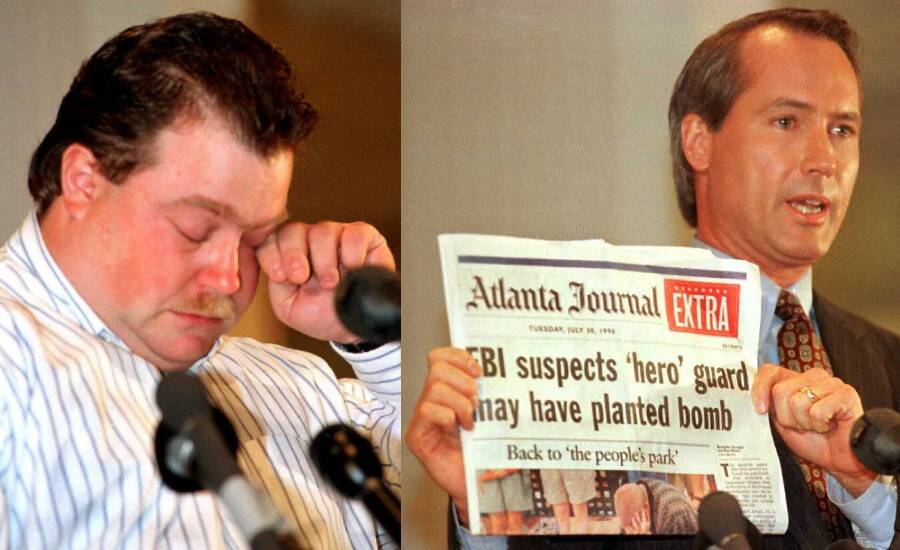
Doug Collier/AFP/Getty ImagesThe story of what happened to Richard Jewell was a tragic case of “trial by media.” Though he was never charged with the bombing, many people presumed that Richard Jewell was guilty due to the intense press coverage.
But just a few days later, media reports surfaced that the FBI had made Jewell the prime suspect in the bombing. The hero quickly became a villain in the public eye. Media outlets across the country — from the Atlanta Journal-Constitution to CNN — painted Richard Jewell as a wannabe cop who was so desperate to play the hero that he was willing to kill people for it.
For an agonizing 88 days, everyone seemed to agree that Richard Jewell was guilty — even though he had never even been officially charged with the crime. In reality, the FBI soon stopped investigating Jewell when they realized that he wasn’t the man they were looking for. And years later in 2005, another man named Eric Rudolph pleaded guilty to planting the bomb.
But it was all too late for Richard Jewell, whose reputation was irrevocably tarnished. The infamous case was later explored in the 2019 movie Richard Jewell. Directed by Clint Eastwood, this film was meant to be a reminder of how rushing to judgment can ruin the life of an innocent person. But the real story of what happened to Richard Jewell is even more tragic.
Who Was Richard Jewell?
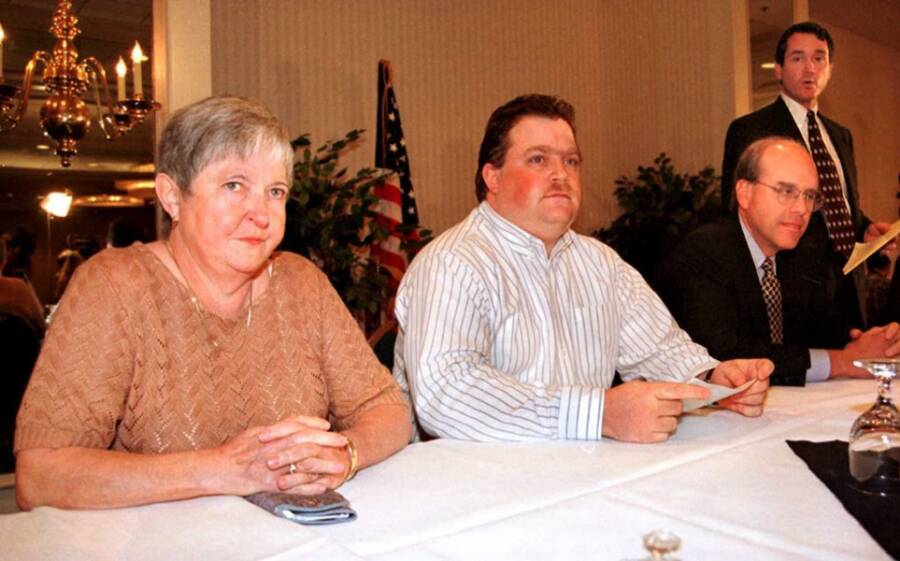
Doug Collier/AFP/Getty ImagesRichard Jewell (center), his mother (left), and two of his attorneys, Watson Bryant and Wayne Grant (right), pictured during a press conference after Jewell’s name was cleared.
Before he emerged into the public consciousness, Richard Jewell led a fairly mundane life. He was born Richard White on December 17, 1962, in Danville, Virginia, and was raised in a strict Baptist home by his mother, Bobi.
When he was four years old, his mother left his philandering father and soon married John Jewell, who adopted Richard as his own son.
When Richard Jewell turned six, the family moved to Atlanta, Georgia. As a boy, Jewell didn’t have many friends, but he kept busy on his own.
“I was a wannabe athlete, but I wasn’t good enough,” he told Vanity Fair in 1997. When he wasn’t reading books about the World Wars, he was either helping out teachers or taking volunteer jobs around the school.
His dream was to be a car mechanic, and so after high school, he enrolled in a technical school in southern Georgia. But three days into classes, Bobi found out that Jewell’s stepfather had abandoned the family. So Jewell dropped out of his new school to be with his mother.
After that, he worked all sorts of odd jobs, from managing a local yogurt shop to working as a jailer at the Habersham County Sheriff’s Office in northeastern Georgia, staying with his mom all the while.
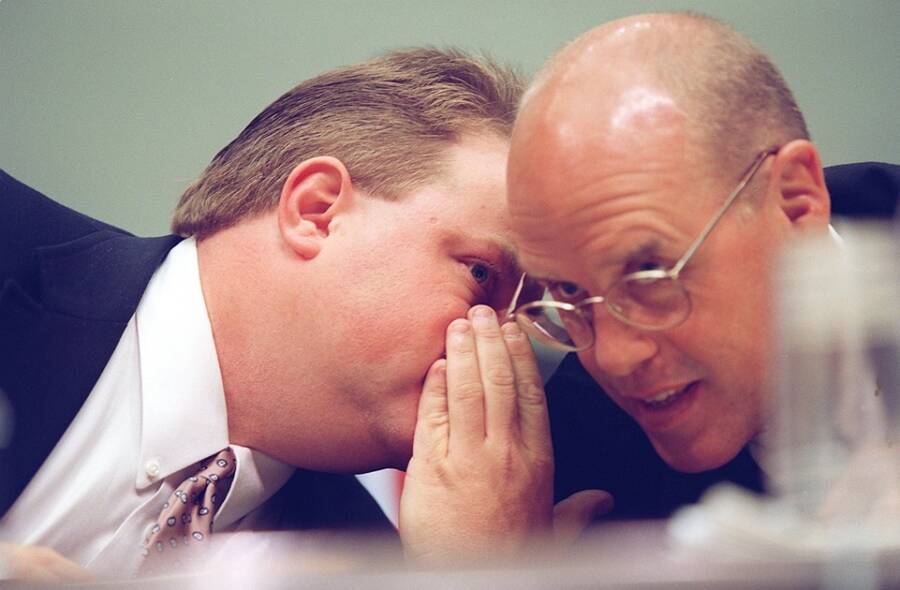
Paul J. Richards/AFP/Getty ImagesRichard Jewell’s primary attorney, Watson Bryant, assembled a large team of lawyers to support his client during his high-profile investigation, during which many assumed that Richard Jewell was guilty.
Soon enough, he thought about going into law enforcement. In 1991, after a year working as a jailer, Richard Jewell was promoted to deputy. And as part of his training, he was sent to the Northeast Georgia Police Academy, where he finished in the top quarter of his class.
From then on, it seemed that Richard Jewell had found his calling.
“To understand Richard Jewell, you have to be aware that he is a cop. He talks like a cop and thinks like a cop,” said Jack Martin, one of Jewell’s attorneys during the Olympic bombing investigation. Jewell’s commitment to upholding the law was obvious from the way he talked about things related to police work — even after his mistreatment by the FBI.
Sometimes Jewell’s overzealousness could get him into trouble. He was once even arrested for impersonating a police officer and placed on probation on the condition that he seek psychological counseling. After wrecking his patrol car and being demoted back to a jailer, Jewell quit the sheriff’s office and found another police job at Piedmont College.
Jewell’s heavy-handedness policing students caused tension with the school’s administrators. According to school officials, he was eventually forced to resign from his post. And in a cruel twist of irony, Jewell’s intense regard for law enforcement was later painted as an obsession — one that might motivate him to take extreme measures to achieve recognition.
Richard Jewell’s Heroics At The 1996 Olympic Park Bombing
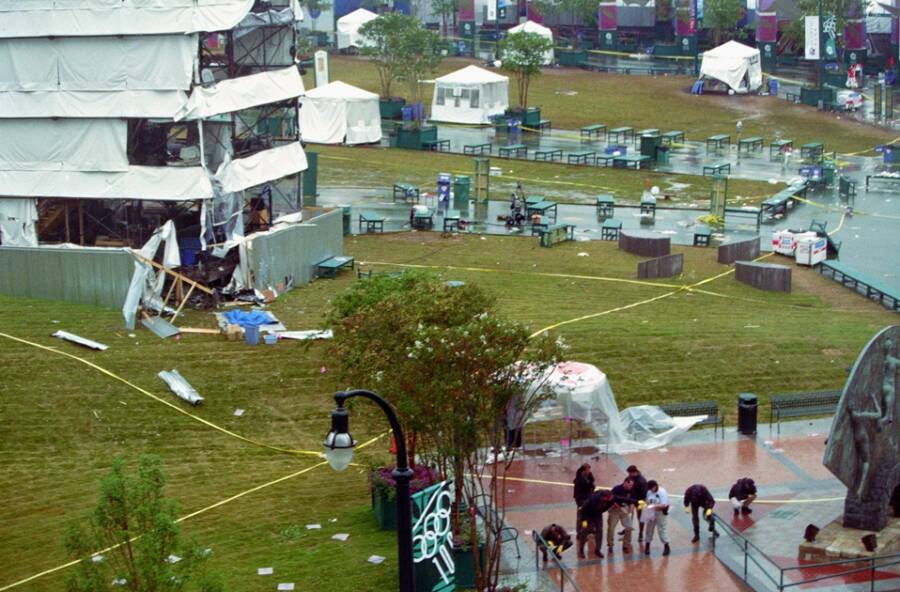
Dimitri Iundt/Corbis/VCG/Getty ImagesTwo people died and hundreds were seriously injured in the Centennial Olympic Park bombing — but Richard Jewell undoubtedly prevented more deaths from happening.
With all the buzz around the 1996 Summer Olympics in Atlanta, Jewell figured there was probably a security job waiting for him there.
It seemed like an opportune time since his mother, who still lived in Atlanta, was planning on undergoing foot surgery. And Jewell ultimately landed a position as one of the security guards working the 12-hour night shift. Little did he know that his new gig would soon throw his life into disarray.
On July 26, 1996, according to Jewell, he left his mother’s house for the Olympic Park at 4:45 p.m. and arrived at the AT&T pavilion 45 minutes later. He took a break to go to the bathroom at around 10 p.m.
When he came back to his station near the sound-and-light tower by a music stage, Jewell noticed a group of drunks littering all over it. He later told an FBI agent that he remembered being annoyed at the group because they had caused a mess and were bothering the camera crew.
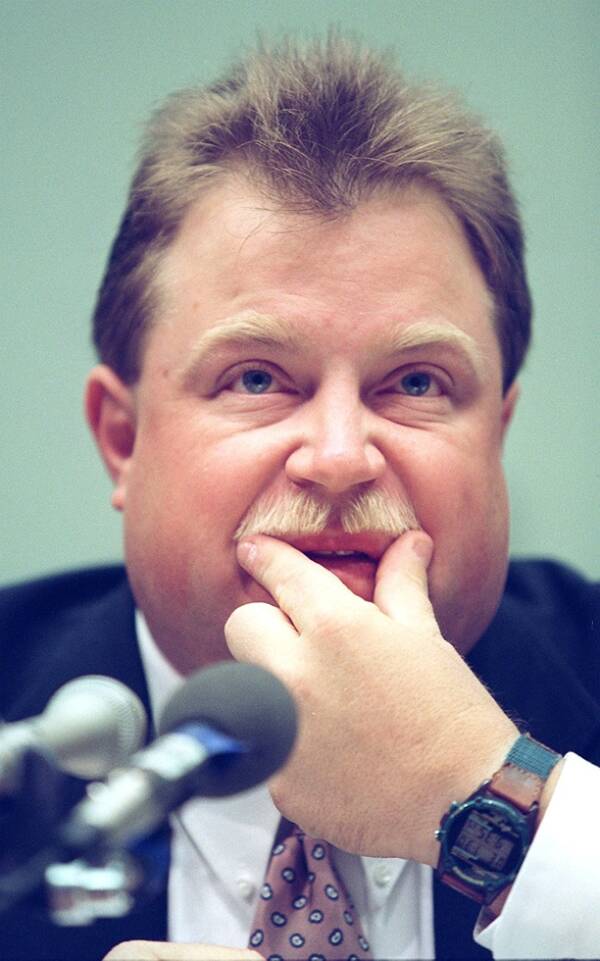
Paul J. Richards/AFP/Getty ImagesThe story of what happened to Richard Jewell would haunt him until his death in 2007.
Being the vigilante that he was, Jewell promptly went to report the drunken litterbugs. But on the way, he spotted an olive-green military-style backpack that had been left unattended underneath a bench. At first, he didn’t think much of it and even joked about the contents of the bag with Tom Davis, an agent with the Georgia Bureau Of Investigation (GBI).
“I was thinking to myself, ‘Well, I am sure one of these people left it on the ground,'” Jewell said. “When Davis came back and said, ‘Nobody said it was theirs,’ that is when the little hairs on the back of my head began to stand up. I thought, ‘Uh-oh. This is not good.'”
Both Jewell and Davis quickly cleared spectators out of the area around the mystery backpack. Jewell also made two trips into the tower to warn and later evacuate the technicians.
At about 1:25 a.m. on July 27, 1996, the backpack exploded, sending pieces of shrapnel onto the nearby crowds of spectators. In the aftermath of the attack, investigators found that the perpetrator had planted nails inside a pipe bomb, a sinister creation meant to inflict maximum harm.
Why Many Thought Richard Jewell Was Guilty
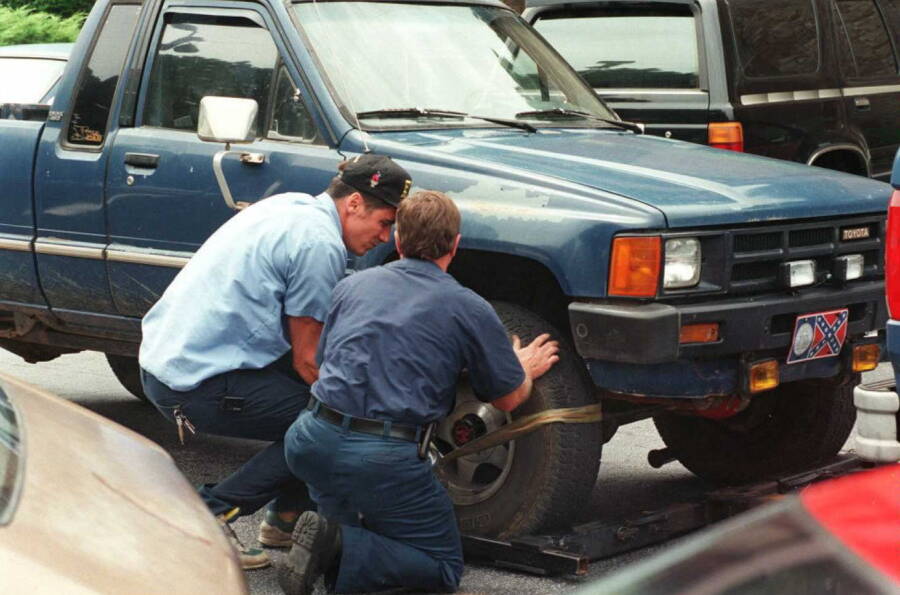
Doug Collier/AFP/Getty ImagesOfficials prepare to tow Richard Jewell’s truck four days after the bombing. This was just the beginning of what happened to Richard Jewell in the aftermath of the attack.
Not long after the explosion, Atlanta’s Centennial Olympic Park was swarming with federal agents. Richard Jewell, who spoke with the first agents to arrive at the park, vividly remembered the chaotic scene following the bomb’s detonation, even a year later.
“It was like what you hear in the movies. It was, like, kaboom,” Jewell said in a 1997 interview. “All the shrapnel that was inside the package kept flying around, and some of the people got hit from the bench and some with metal.”
Later reports revealed that a 911 call from a nearby phone booth had tipped dispatchers off to the threat: “There is a bomb in Centennial Park. You have 30 minutes.” It had likely been the bomber.
The Centennial Olympic Park explosion killed one woman and injured 111 others (and a cameraman also died of a heart attack while rushing to film the scene), but the number of deaths could’ve easily been much worse had the area not been partially evacuated by Richard Jewell.
Once the press caught wind of Richard Jewell’s discovery of the bag and the action he took to evacuate the crowd, he was quickly hailed as a hero.
But his fame soon turned to infamy after the Atlanta Journal-Constitution published a front-page story with a headline that suggested Richard Jewell might have been guilty of planning the attack in the first place: “FBI Suspects ‘Hero’ Guard May Have Planted Bomb.”
Kathy Scruggs, a police reporter at the publication, had apparently received a tip from a friend in the federal bureau that the agency was looking at Richard Jewell as a suspect in the bombing investigation. The tip was confirmed by another source, who worked with the Atlanta police.
Most damaging was one specific sentence in the piece: “Richard Jewell… fits the profile of the lone bomber,” which was published despite no public declarations by the FBI or criminal behavior experts. Other news outlets picked up the bombshell story and used similar language to profile Jewell, painting him as a lone-man bomber and wannabe cop.
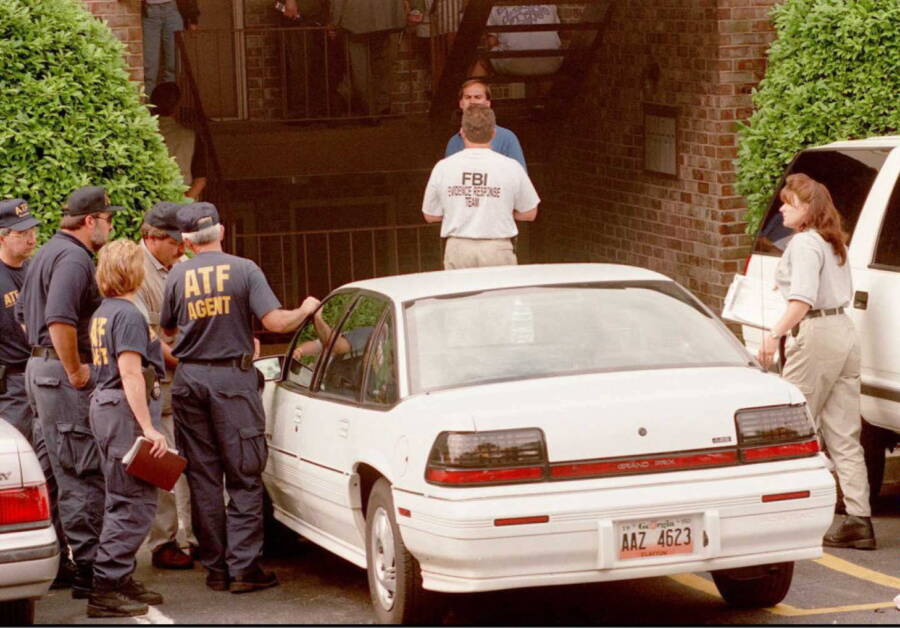
Doug Collier/AFP/Getty ImagesFederal authorities searched Richard Jewell’s apartment for evidence that might link him to the bombing. This only further fueled speculation that Richard Jewell was guilty.
“They were talking about an FBI profile of a hero bomber and I thought, ‘What FBI profile?’ It rather surprised me,” said the late Robert Ressler, a former FBI agent from the Behavioral Science Unit, who interviewed notorious killers like Ted Bundy and Jeffrey Dahmer during his career.
According to Ressler, who co-authored the Crime Classification Manual used by the FBI, the “hero bomber” profile does not exist.
Ressler suspected the term was a bombastic spin on “hero homicide,” which refers to an individual who is hungry for recognition but wouldn’t kill anyone.
For 88 days following the report of the FBI’s investigation into Richard Jewell, he and his mother were engulfed in a media storm. Investigators searched his mother’s apartment and brought Jewell in for questioning while news vans staked outside his mother’s residence.
In October 1996, after exhaustive probes suggested Richard Jewell could not have planted the bomb based on his whereabouts that night, the U.S. Justice Department formally cleared him as a suspect in the Centennial Park bombing investigation. But the damage to his reputation was irrevocable.
“You don’t get back what you were originally,” Jewell said. “I don’t think I will ever get that back. The first three days, I was supposedly their hero — the person who saves lives. They don’t refer to me that way anymore. Now I am the Olympic Park bombing suspect. That’s the guy they thought did it.”
The Aftermath Of A Tumultuous “Trial By Media”
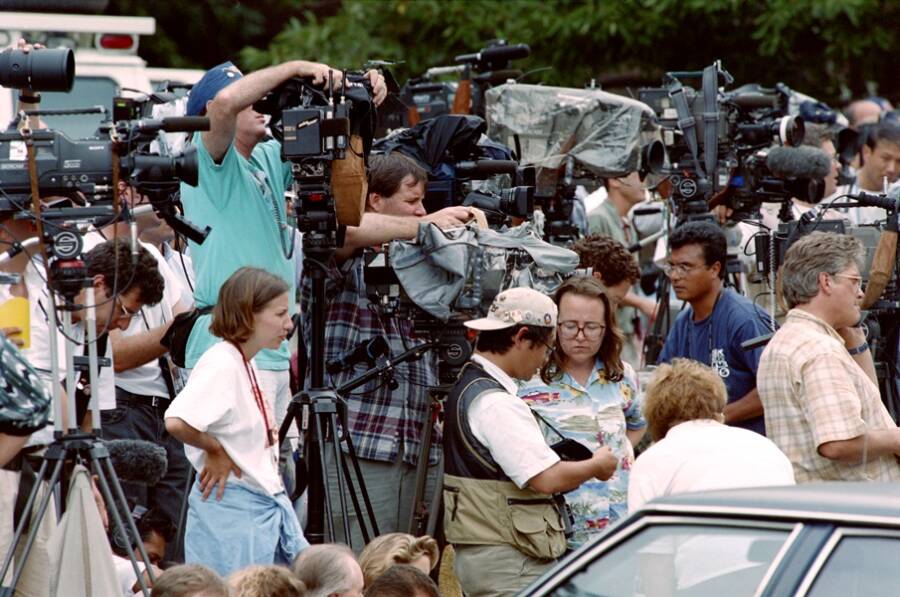
Doug Collier/AFP/Getty ImagesPhotographers, television crews, and reporters set up outside Richard Jewell’s apartment. Richard Jewell would later win settlements from several news outlets that reported on his case.
The story of what happened to Richard Jewell is now a case study in irresponsible reporting by the press and reckless investigation by the FBI.
“This case has everything — the FBI, the press, the violation of the Bill of Rights, from the First to the Sixth Amendment,” said Watson Bryant, one of Jewell’s attorneys, of his client’s infamous case.
The catalyst of the inquiry into Jewell’s innocence was a phone call made by Piedmont College President Ray Cleere, Jewell’s former boss, who told the FBI about the security guard’s alleged overzealousness and his forced departure from the school. But no one else can be held accountable for the mismanagement of the investigation except for the bureau.
A Vanity Fair report a year after the bombing revealed internal tensions stemming from toxic rivalries and a micromanaging leadership, specifically from then-FBI Director Louis Freeh, within the agency. The FBI’s treatment of the case was so bad that an inquiry was made, and Richard Jewell was invited to testify at congressional hearings over the bureau’s conduct.
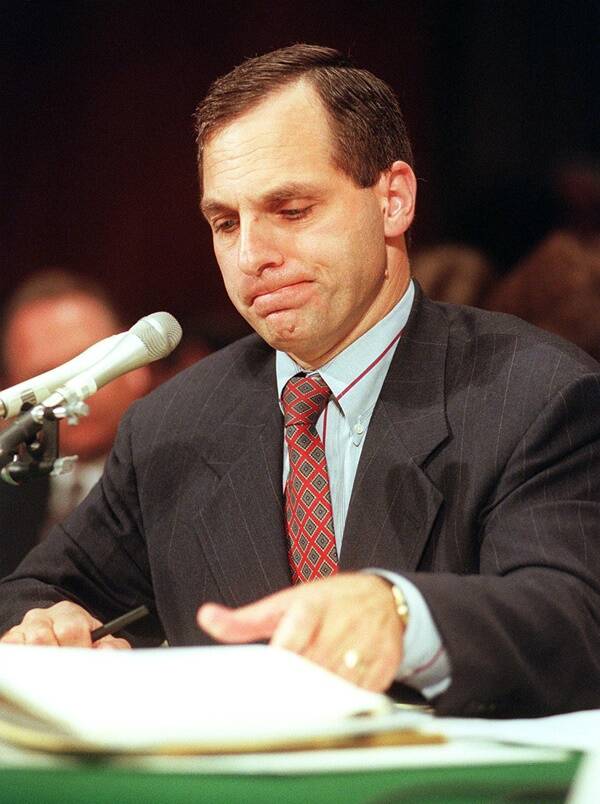
Joyce Naltchayan/AFP/Getty ImagesFBI director Louis Freeh during a congressional hearing. Later reports revealed severe mismanagement during the Olympic Park bombing investigation — and what really happened to Richard Jewell during the case.
It was then revealed that Richard Jewell had been interrogated as a suspect under false pretenses by FBI agents who were directly handling the bombing case. On July 30, 1996, FBI agents Don Johnson and Diader Rosario brought Jewell to the agency’s headquarters for questioning under the guise of helping them make a training video for first responders.
Reexaminations of the reporting surrounding the case also revealed egregious journalistic mistakes. The tone of the coverage insinuated that Richard Jewell was guilty despite the lack of evidence to support this claim and painted him as a fame-hungry wannabe hero.
The New York Post called him “a Village Rambo” and “a fat, failed former sheriff’s deputy.” Jay Leno said that Jewell “had a scary resemblance to the guy who whacked Nancy Kerrigan,” and questioned, “What is it about the Olympic Games that brings out big fat stupid guys?”
Meanwhile, Dave Kindred, a columnist at the Atlanta Journal-Constitution, not only implied that Richard Jewell was guilty but also compared him to convicted murderer and suspected child serial killer Wayne Williams: “Like this one, that suspect was drawn to the blue lights and sirens of police work. Like this one, he became famous in the aftermath of murder.”
What Happened To Richard Jewell? Settlements With Media Outlets And His Tragic Early Death
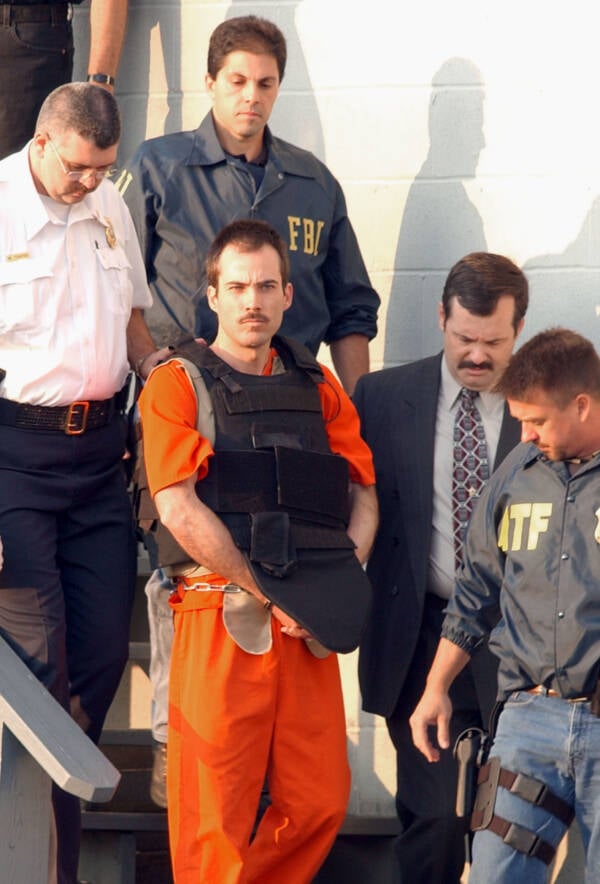
Erik S. Lesser/Getty ImagesEric Rudolph, the real bomber behind the Olympic Park attack, pled guilty in 2005. Tragically, Richard Jewell’s death came just two years later.
After the investigation, Richard Jewell sued several news outlets for libel and won settlements from Piedmont College, the New York Post, CNN, and NBC (the latter for a reported $500,000). However, he lost a decade-long battle with Cox Enterprises, the parent company of the Atlanta paper.
The libel case against the Journal-Constitution continued years after Richard Jewell’s death in 2007 and even went all the way up to the Georgia Supreme Court. But the Court ultimately ruled that because the paper’s reporting was true at the time of publication — that he was indeed an FBI suspect in the days after the bombing — it didn’t owe Jewell or his family anything.
Nevertheless, no amount of settlements could have ever given Richard Jewell back two important things he lost: his dignity and peace.
“I hope and pray that no one else is ever subjected to the pain and the ordeal that I have gone through,” he said through tears during a press conference after the Justice Department cleared him of the bombing.
“The authorities should keep in mind the rights of the citizens. I thank God it is ended and that you now know what I have known all along: I am an innocent man.”
Years after Richard Jewell’s exoneration, the real bomber Eric Rudolph pled guilty to the attack — as well as three other bombings — in 2005. Tragically, Richard Jewell’s death came just two years later.
On August 29, 2007, Richard Jewell died from heart disease and complications from diabetes. He was just 44 years old — meaning he had precious little time to enjoy his life after the bombing and subsequent media frenzy upended it.
Tellingly, even after Richard Jewell’s death, some obituaries still described him as a “suspect” of the bombing in the headlines. However, others described him as a hero — the title that he should have held all along.
After reading about the wrongfully accused Richard Jewell, learn about two actual bombers: Ted Kaczynski, the Unabomber, and the “Mad Bomber” George Metesky, who terrorized New York City for 16 years.





